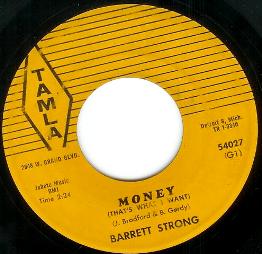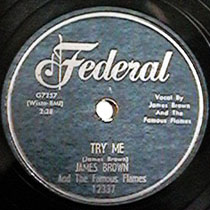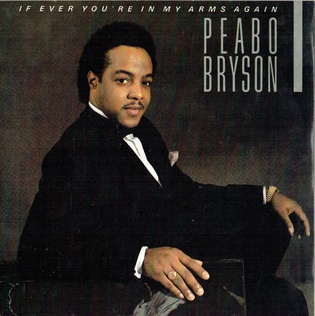
"Money (That's What I Want)" is a rhythm and blues song written by Tamla founder Berry Gordy and Janie Bradford, which was the first hit record for Gordy's Motown enterprise. Barrett Strong recorded it in 1959 as a single for the Tamla label, distributed nationally on Anna Records. Many artists later recorded the tune, including the Beatles in 1963 and the Flying Lizards in 1979.
"Peppermint Twist" is a song written by Joey Dee and Henry Glover, recorded and released by Joey Dee and the Starliters in 1961. Capitalizing on the Twist dance craze and the nightclub in which Dee performed, the song hit No.1 on the U.S. Billboard Hot 100 in early 1962. The original recording of the song was considered too long for release on a 45 rpm single, so it was split into two parts. It was this first part, "Peppermint Twist ", with a length of 2:03, which became the No.1 hit; the mostly instrumental second half of the recording is rarely heard today.

"(If Loving You Is Wrong) I Don't Want to Be Right" is a song written by Stax Records songwriters Homer Banks, Carl Hampton, and Raymond Jackson. Originally written for The Emotions, it has been performed by many singers, most notably by Luther Ingram, whose original recording topped the R&B chart for four weeks and rose to number 3 on the Billboard Hot 100 in 1972. Billboard ranked it as the No. 16 song for 1972.

"Since I Don't Have You" is a song written and composed by Jackie Taylor, James Beaumont, Janet Vogel, Joseph Rock, Joe Verscharen, Lennie Martin, and Wally Lester. It was first a 1958 hit single for the doo-wop group the Skyliners on the Billboard Hot 100. Country music singer Ronnie Milsap had a hit with the song in 1991. American hard rock band Guns N' Roses also had some success in 1994 with their version of the song which reached the top 10 on the UK Singles Chart.
"Zip-a-Dee-Doo-Dah" is a song composed by Allie Wrubel with lyrics by Ray Gilbert for the Disney 1946 live action and animated movie Song of the South, sung by James Baskett. For "Zip-a-Dee-Doo-Dah", the film won the Academy Award for Best Original Song and was the second Disney song to win this award, after "When You Wish upon a Star" from Pinocchio (1940). In 2004, it finished at number 47 in AFI's 100 Years...100 Songs, a survey of top tunes in American cinema.

"Until You Come Back to Me (That's What I'm Gonna Do)" is a song written by Morris Broadnax, Clarence Paul, and Stevie Wonder. The song was originally recorded by Stevie Wonder in 1967, but his version was not released as a single and did not appear on an album until 1977's anthology Looking Back. The best-known version of this song is the 1973 release by Aretha Franklin, who had a million-selling top 10 hit on Billboard charts. The song reached No. 1 on the R&B chart and No. 3 on the Hot 100 chart in 1974. It became an RIAA Gold record.

"Breaking Up Is Hard to Do" is a song recorded by Neil Sedaka, co-written by Sedaka and Howard Greenfield. Sedaka recorded this song twice, in 1962 and 1975, in two significantly different arrangements, and it is considered to be his signature song. Between 1970 and 1975, it was a top-40 hit three separate times for three separate artists: Lenny Welch, The Partridge Family and Sedaka's second version.

"Hey Nineteen" is a song by the band Steely Dan from their album Gaucho (1980).

"I'll Take You There" is a song written by Al Bell, and originally performed by soul/gospel family band the Staple Singers. The Staple Singers version, produced by Bell, was released on Stax Records in February 1972, and spent a total of 15 weeks on the charts and reached #1 on the Billboard Hot 100. It is ranked as the 19th biggest American hit of 1972.

"The End of the World" is a pop song written by composer Arthur Kent and lyricist Sylvia Dee, who often worked as a team. They wrote the song for American singer Skeeter Davis, and her recording of it was highly successful in the early 1960s, reaching the top five on four different charts, including No. 2 on the main Billboard Hot 100. It spawned many cover versions.

"Another Saturday Night" is a 1963 hit single by Sam Cooke from the album Ain't That Good News. The song was written by Cooke while touring in England when staying in a hotel where no female guests were allowed. It reached No. 10 on the Billboard Hot 100 and was No. 1 on the R&B chart for a single week. In the UK, the song peaked at No. 23 on the UK Singles Chart.

"Slow Hand" is a song recorded by American vocal group The Pointer Sisters for their eighth studio album Black & White (1981). The song, written by Michael Clark and John Bettis, was released by the Planet label in May 1981 as the lead single from Black & White.

"Try Me", titled "Try Me (I Need You)" in its original release, is a song recorded by James Brown and The Famous Flames in 1958. It was a #1 R&B hit and charted #48 Pop - the group's first appearance on the Billboard Hot 100. It was Brown and the Flames' second charting single, ending a two-year dry spell after the success of "Please, Please, Please".
"(Now and Then There's) A Fool Such as I" is a popular song written by Bill Trader and was published in 1952. Recorded as a single by Hank Snow it peaked at number four on the US country charts early in 1953.

Dee Clark was an American soul singer best known for a string of R&B and pop hits in the late 1950s and early 1960s, including the song "Raindrops", which became a million-seller in the United States in 1961.

"(Theme from) Valley of the Dolls" is a 1967 song by André and Dory Previn, composed for the film version of the Jacqueline Susann novel Valley of the Dolls, and recorded by Dionne Warwick.

"Cupid" is a song by American singer Sam Cooke, released on May 16, 1961. It charted at number 17 on the Billboard Hot 100 and number 20 on the Hot R&B Sides chart; the track performed best in the United Kingdom, peaking at number seven on the UK Singles Chart. Cooke's producers had asked him to write a song for a girl they had seen on a Perry Como TV show—but once they heard her sing, they kept "Cupid" for Cooke himself.

"If Ever You're in My Arms Again" is a 1984 song recorded by American contemporary R&B singer Peabo Bryson. Released as a single from his album Straight from the Heart, the single peaked at number 6 on the R&B chart and was Bryson's first Top 10 single on the Billboard Hot 100 chart, where it peaked at number 10 during the summer of 1984. It also spent four weeks at number 1 on the adult contemporary chart.
"Funny How Time Slips Away" is a song written by Willie Nelson and first recorded by country singer Billy Walker. Walker's version was issued as single by Columbia Records in June 1961 and peaked at number 23 on the Hot C&W Sides chart. The song would go on to be featured in several live action films and shows, such as in the first episode of the second season of AMC’s “Better Call Saul,” or the 2020 Netflix drama “The Devil All the Time.”

Love Story is a compilation album by American pop singer Andy Williams that was released in the UK in July 1971 by the CBS Records division of Columbia and was mainly composed of tracks that had not been included on his studio LPs.
















